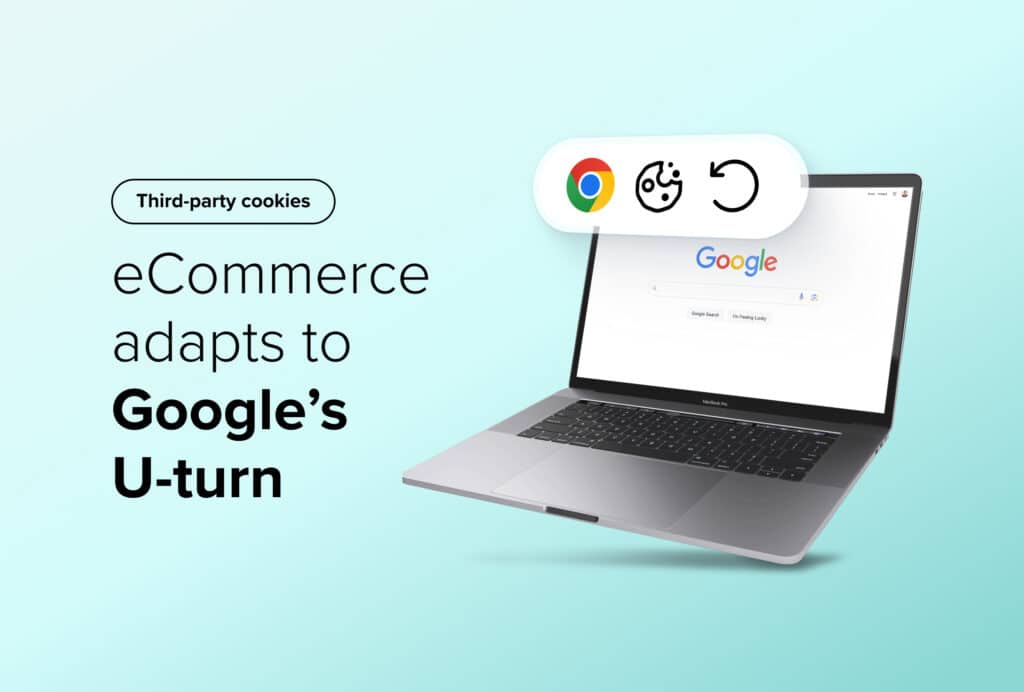Google Abandons Third-Party Cookie Phase-Out: What It Means for eCommerce
By Laura Taylor • Last updated: Tuesday Jul 30th, 2024

In a surprising turn of events, Google has decided to abandon its plan to phase out third-party cookies, a move that has significant implications for online privacy, digital advertising, and the eCommerce industry at large.
This sudden U-turn has raised numerous questions about the future of online tracking and personalisation. In this article, we’ll review the changes, the impact this will have on eCommerce retailers and the steps you can take to mitigate the effects of the uncertain online landscape.
Putting the changes into context
Originally, Google intended to eliminate third-party cookies by 2022, to enhance user privacy and reshape digital advertising. However, the plan faced delays and was pushed back to early 2025, before the recent decision to scrap this plan altogether.
The recent news comes as a shock to many and signals just how fast the digital landscape can change.
What are third-party cookies?
Third-party cookies are pieces of data created by websites different from the ones users are currently visiting. These are stored on their devices and used to track users between websites. These cookies store information such as user location, search trends, behaviour and preferences that marketers can then use to serve targeted, relevant ads.
This form of cookies tracks user actions across websites and devices to ensure the ad content they view is personalised and tailored to their interests.
Retailers rely on third-party cookies to expand ad reach, accurately target audiences and ultimately contribute to revenue generation.
Why did Google originally plan to remove third-party cookies?
The decision to phase out third-party cookies was part of Google’s commitment to user privacy and the increasing user demand for transparency and control over their data.
The move was intended to promote the use of more privacy-conscious people-based targeting and technologies like Federated Learning of Cohorts (FLoC), which aimed to group users with similar interests rather than tracking individuals.
Why did Google abandon the third-party cookie phase-out?
Several factors influenced Google’s decision to keep third-party cookies. The complexity of developing alternative methods such as FLoC seems to have proved more challenging than initially anticipated.
There was also increasing concern over the effectiveness of the proposed alternative methods from advertisers and other stakeholders. In an attempt to create a balance between privacy and profitability, many feared it would disrupt business models and campaign performance.
Google’s Privacy Sandbox was also flagged by regulators for privacy concerns.1
What’s happening instead?
Google will still implement additional privacy measures, allowing users to quickly and easily turn third-party cookies on or off. This will apply across their entire Google accounts.
It’s adopting an updated approach that will see “a new experience in Chrome that lets people make an informed choice that applies across their web browsing, and they’d be able to adjust that choice at any time.”2
Instead of scheduling the third-party cookie removal, Google has left it in the hands of users. And when given the option, users “overwhelmingly opt out.”3
Impact on eCommerce retailers
As you were no doubt amid preparations for the removal of third-party cookies, eCommerce retailers must now adapt once again to a change in direction for the digital landscape.
Implications on privacy
Google’s failed attempt to remove third-party cookies highlights the challenge of balancing protecting user privacy with ensuring the performance of digital advertising.
eCommerce retailers now face the question of relying on a tool that’s increasingly controversial and has received high-profile criticism.
While third-party cookies remain available for use, it’s a juggling act for online retailers to respect user privacy while using detailed customer data.
Effects on eCommerce advertising
Although Google’s decision offers short-term stability with your current advertising strategy, it nevertheless raises concerns about the speed at which the digital advertising landscape can change.
Retailers can continue to use third-party cookies for detailed insights into customer behaviour, audience targeting, personalisation, and campaign monitoring. However, to future-proof your business against additional changes, it’s advisable to look beyond third-party data.
eCommerce businesses must remain vigilant and adaptive to future changes in privacy standards and regulations.
What you should do now
Despite the change securing the immediate future of digital advertising, eCommerce retailers need to be prepared for any eventuality.
Consumer sentiment towards increasing improving privacy and respecting the use of their data remains high. Brands that choose to adhere to these expectations will build customer trust and loyalty.
Ongoing developments in privacy regulations may also be a cause for concern should retailers continue to solely rely on third-party cookies for advertising strategies.
But there are steps you can take to mitigate the effects of future uncertainty.
Diversify your strategies
With controversy around third-party cookies still strong despite Google’s U-turn, retailers need to fortify their strategies to prepare for an evolving landscape.
Look for more privacy-conscious marketing and advertising strategies. One such example is prioritising first-party data collection that aligns with evolving privacy expectations.
This could include implementing data capture campaigns on your website that feed into your email marketing and advertising strategies. Using these communication methods will help you build strong relationships with your customers, adhering to transparent data practices.
Bolstering your data strategy will help secure your business against future external changes that could be detrimental to your revenue streams.
Stay informed
As we’ve already seen, things can change quickly. This means you need to stay informed about new privacy-enhancing technologies, regulations and practices.
Calls for the protection of user data and increased privacy will continue to shape the future of eCommerce and the methods retailers should use to communicate with their current and prospective customers.
Those who are seen to already be prioritising customer data will win the loyalty of their visitors.
Where does this leave eCommerce?
The digital landscape is entering a privacy-first marketing era. Retailers that get ahead of changes will build loyalty amongst their customers.
Google scrapping the removal of third-party cookies can provide some short-term stability for personalisation and ad targeting, but the challenge of balancing privacy and digital advertising remains.
As a data-driven solution, Salesfire prioritises first-party data collection and offers a range of tools that are created specifically for the ethical and privacy-conscious collection and use of customer data.
1 Google’s Privacy Sandbox terms may, ironically, violate privacy law, new research says | The Drum
2 In shock decision, Google abandons third-party cookie deprecation plans | The Drum
Give us a call on 020 4505 9040 or book a demo to see how we can improve your data collection to feed your ad and marketing campaigns.



